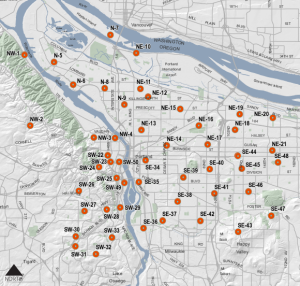Basic Earthquake Emergency Communications Nodes (BEECN): Difference between revisions
| Line 49: | Line 49: | ||
|Marketing the BEECN program via bike trailer ads around Portland | |Marketing the BEECN program via bike trailer ads around Portland | ||
|- | |- | ||
| | |2020.08.09 | ||
|Debut and installation of the new BEECN cache design | |Debut and installation of the new BEECN cache design | ||
|- | |- | ||
Revision as of 17:24, 16 December 2024
Portland's Basic Earthquake Emergency Communication Node (BEECN) program is a network of locations across the city where residents can go after a major earthquake to request emergency assistance and access critical information when phone lines are down. BEECN sites are equipped with radios to connect community members with emergency responders.
BEECN Program Introduction
In the event of a major earthquake, Portland’s communication systems—such as cell phones, landlines, and the internet—are likely to fail due to the damage caused by the Cascadia Subduction Zone earthquake. As a result, many neighborhoods will be cut off from emergency responders, making it difficult for residents to receive information or request help.
To address this, the Basic Earthquake Emergency Communication Node (BEECN) program provides 50 communication sites throughout Portland, where volunteers and city employees use durable amateur radio systems ("HAM") to relay messages between local neighborhoods and the city’s Emergency Operations Center (EOC). Within 24 to 48 hours of the quake, BEECNs enable two-way communication, allowing residents to report damage, injuries, or request assistance, while also receiving critical response and resource information. These sites are not for emergency supplies or medical services, but rely on community volunteers to ensure their success and facilitate effective communication during a disaster.
Key BEECN Information Resources
Outside the program guidelines in this Wiki, Portlanders can find other important BEECN resources:
| City of Portland Official BEECN website | BEECN volunteer training information, maps, and program information in translation. |
| Printable BEECN map request form | Form to request free printed BEECN postcard maps. |
| BEECN Readiness Dasboard | Displays the current state of readiness of the BEECN program. |
| Portland NET Tumblr: BEECN tag | Any tagged articles/news items relevant to the BEECN program. |
BEECN Program History
In September 2012, Portland Mayor Sam Adams directed the Portland Bureau of Emergency Management to design and implement the BEECN program. The initial idea came from Mayor Adams himself after observing a similar program in Seattle. Mayor Adams instructed PBEM to fully deploy the program before December 31 of that year with 48 sites (two more sites were added later, for a total of 50).
With only three months to implement, PBEM Operations Manager David Blitzer teamed with PBEM new hire Jeremy Van Keuren to scope out site locations. Funding for much of the program would come from the Regional Disaster Policy Organization through a 2010 UASI grant, for a total cost of $151,496. The Mayor's Office contributed an additional $60,000 to market the program by sending a BEECN postcard to every home and business in the City of Portland. The postcards dropped in early December 2012, and Mayor Adams officially kicked the program off on December 12.
| Date | BEECN Program Milestones |
|---|---|
| 2012.12.12 | BEECN program officially kicks off |
| 2013.03.16 | First test of the BEECN system |
| 2015.10.09 | PBEM recruits Ernie Jones to manage the BEECN program |
| 2017.10.03 | Publication of the first edition of the BEECN Guidelines |
| 2018.08.02 | Marketing the BEECN program via bike trailer ads around Portland |
| 2020.08.09 | Debut and installation of the new BEECN cache design |
| 2024.01.25 | Ernie Jones retires from PBEM |
